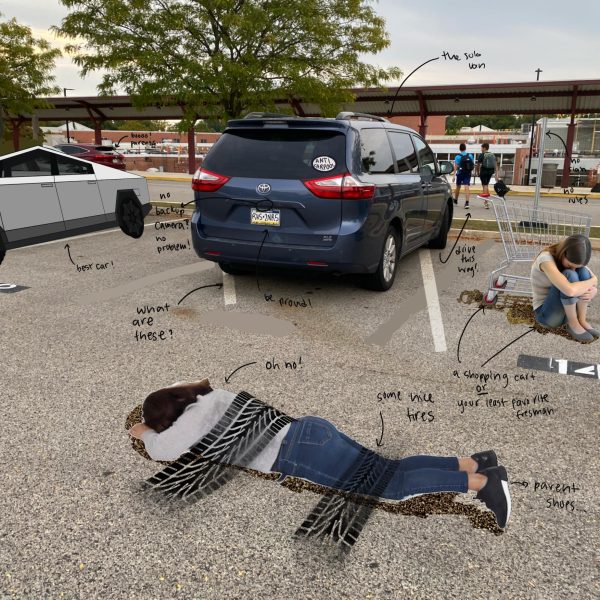Hollywood Should Be the Ones Saying "I can do that"
February 25, 2016
Diversity is something that Hollywood and record companies have been trying to institutionalize for quite some time now. There have been some strides in this, from black artists like Beyoncé winning well-deserved Grammies, to people like Aziz Ansari and Mindy Kaling, Indian comedians getting their own television series. Even though it is clear that pop culture and media are trying their best to incorporate diversity, they are still lagging behind. This year, no black actors were nominated for any Oscar awards. Beyoncé was frowned upon by numerous people for her Super Bowl performance because it saluted black lives everywhere. No Asian actor has won an Oscar or any Academy Awards for God knows how long. But there is one place that is surging ahead in the quest for diversity on the stage. That place is the “Great White Way.” In the past year alone, Broadway has been as diversified as ever. The musical “Allegiance,” taking place in Japan, came out featuring George Takei and Lea Salonga, as well as a mainly Asian cast. Lin Manuel-Miranda’s “Hamilton” has recently hit the stage, featuring a mainly African American and Latino cast while providing a fresh take on one of our country’s founding fathers. “The Color Purple,” based on the popular novel and movie, has found its way back to Broadway this year with actresses like Jennifer Hudson and Cynthia Erivo in the starring roles.
Even deaf actors are starting to get the chance to perform more often and diversify the stage. The deaf Wests version of the contemporary German musical “Spring Awakening” with music composed by Duncan Sheik came to Broadway this season. The cast was composed of half deaf and half speaking actors, and sign language was incorporated into the choreography for the show, making it all the better. The show’s cast included Marlee Matlin, the only deaf actor to ever win an acting Oscar, for her role in “Children of a Lesser God” (1986).
It is not just new shows written for ethnic casts that are making way for all actors, but also the old shows with new twists. This past year in Rogers and Hammerstein’s Cinderella on Broadway, Laura Osnes was later replaced by black actress Keke Palmer. And “My Fair Lady” is trying to revive itself on Broadway next season, and there have been rumors from the producers of potentially having someone from a minority race star as Eliza Doolittle. It is very important for people, especially children, to see such traditionally white roles be played by someone of a different race, or even just seeing children of minority races on the stage. There has never been a minority actress playing Annie, but in the new musical sensations “School of Rock” and “Matilda,” the students in the cast are made up of children from numerous ethnic backgrounds.
Now even though it is evident that Broadway has certainly made some great strides for diversity on the stage, of course they are nowhere near perfect. The amount of Caucasian actors compared to minorities occupying the stage is immense. Especially when it comes to Asian, Middle Eastern, and Indian actors. It seems that the only roles occupied by actors of these race are when it is necessary. Now there are more growing roles that are typically played by actors of said minority races, such as Gary and Christmas Eve in “Avenue Q” that has been playing at the New World Stages for the past year. So, even with such strides for diversity, some minority presences are still lacking on Broadway.
In 2014, “Aladdin” opened on Broadway. The cast included a black performer named James Monroe Iglehart who ended up receiving a Tony award for his performance as the Genie. The cast also included Adam Jacobs as Aladdin, Courtney Reed as Princess Jasmine, Jonathan Freemen as Jafar, and Clifton Davis as the Sultan. As the majority of people know, the story of Aladdin takes place in the fictional Middle Eastern city of Agrabah. So why did none of the stars come from a Middle-Eastern descent? Courtney Reed is of mixed ethnicity, and in a recent interview with Vanity Fair she said “It’s tricky in this business, because when you’re someone who’s mixed ethnicity, they have a hard time putting you in certain categories, because maybe you’re not Latin enough, or white enough.” It is fundamentally wrong for minority actors to be judged by how much they could pull of being white, or Latino, just to get a role.
Despite some challenges, Broadway has made such tremendous improvements in the past few years about allowing more minority group actors”to have [their] names be synonymous with being on the top.” Hollywood and pop culture need take a page out of Broadway’s book of featuring diversity and tolerance in the spotlight.






